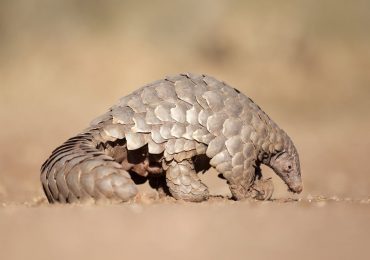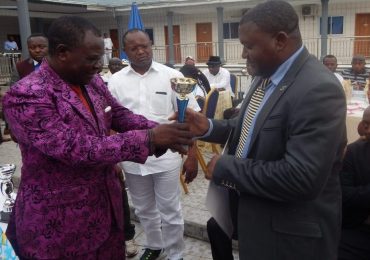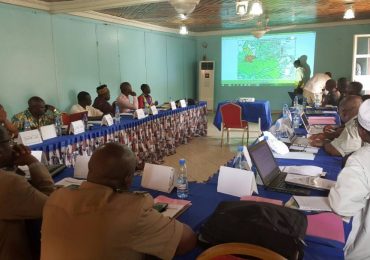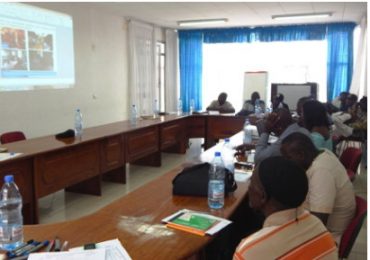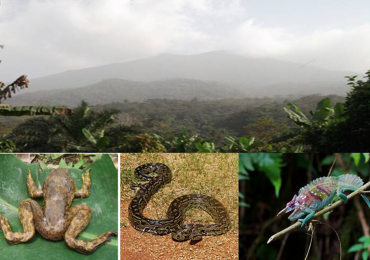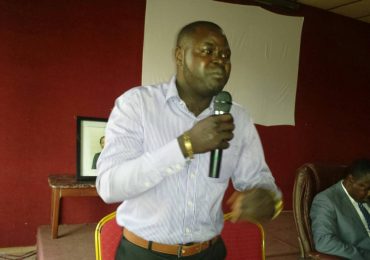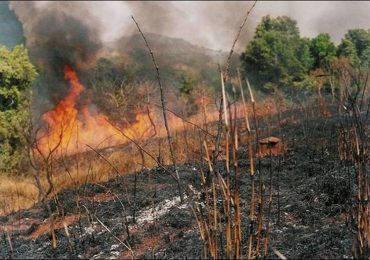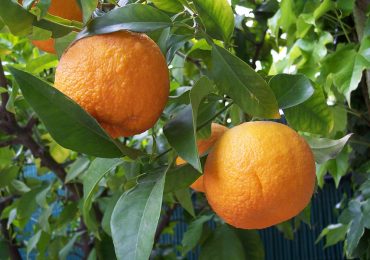After 12 years of processing timber in Nguti Sub-division, Kupe-Muanenguba Division in the South West, WIJMA/CAFECO has left the people in a desperate situation and with little choice but to agitate for their social benefits; electricity, rejected wood and charcoal.
WIJMA exploits timber in Eyumojock and Tinto in Manyu Division and only processes the wood in Nguti.
By Azore Opio
The question regarding the social benefits accruing from WIJMA were somewhat laid to rest at a meeting. But not before a demonstration by youths of Nguti town at the WIJMA/CAFECO sawmill, which opened the lid on a ‘secret deal’ between the company and some Nguti elites.
“We held a meeting with the administration of WIJMA and the company accepted to repair the old council generator that used to supply electricity to the town and buy a transformer. Two committees were also created to control rejected wood and sell charcoal produced at the sawmill,” Eyeni Eyeni Davran, President of the Nguti Youths and Development Association (NGUYOCUDA-BANE’EBUM) told The Green Vision.
The pressure mounted by the youths May 12 – 16, 2014 and a traditional injunction placed at the sawmill gate produced shocking revelations about ‘secret’ deals struck between WIJMA and some Nguti elites.
Eyeni Eyeni said Nzo Ekah-Nghakay, a Nguti indigene and former minister during Ahmadou Ahidjo’s reign, brought WIJMA/CAFECO to Nguti about 12 years ago.
“But we discovered that the company has no memorandum of understanding with the villagers. Only the external elites like Dr. Elombi Eyompe, Napoleon Nyake, and others linked up with WIJMA to ‘eat alone,’” said the NGUYOCUDA President.
On May 12, about 2.000 Nguti youths had marched to the WIJMA sawmill, demanding social payback from the company.
The youths had earlier on February 17, 2014 written a letter to WIJMAN requesting for dialogue between them and the management of the timber factory.
In part, the letter reads, “…after extensive consultations with youths of Nguti at home and abroad…we are highly interested to know your Corporate Social Responsibility (CSR) towards your host community.”
Exactly a month later on March 17, the youths wrote a reminder to WIJMA. In response, the company accused the youths of being ‘irresponsible banga smokers’ who had no right to make demands to WIJMA.
Part of the reply said, “…following your correspondence, we are surprised at your irresponsible attitude of rejecting your local elites who are in effect those to discuss with us. In any case, your association is not well represented and its objectives are not in accord with ours. In this case, we would like to inform you that the management of CAFECO has decided that the meeting you have requested will not hold.”
The letter signed by the Managing Director, S. M Valentine Mouyenga, seemed to pique the youths as they wrote to the Divisional Officer for Nguti. This single reaction produced the desired effect in the Nguti population.
“Sir… we wish to reiterate the fact that we are responsible youths of Cameroon and it is our fundamental right to ask questions when necessary,” reads the letter. “We have sent a series of correspondences to the management of WIJMA/CAFECO appealing for dialogue. In all our correspondences, we have shown great respect to this company as a moral person…”
It is in the letter to the Divisional Officer that the youths began opening the lid on WIJMA’s ‘unfriendly’ environmental activities following an audit report that was carried out at the WIJMA’s sawmill by Centre Africain de Recherches Forestieres Appliquees et Developpement (CARFFAD), to assess the ecological performance of the wood processing plant, including socio-economic features in order to propose appropriate measures to either mitigate related negative impacts or optimize those that are instead positive.
The audit noted six important setbacks with the last four directly concerning the community of Nguti; that the relationship between neighbouring populations and the sawmill is not good; that the management of waste wood is still a real environmental problem; the protection of receiving environments including the atmosphere and surface water is not assured and public sensitisation on environmental hazards associated with the running of the sawmill is absent.
The youths went on to state that the CARFFAD audit report indicated that WIJMA has poisoned the community of Nguti and obtained certification from Forest Stewardship Council (FSC) by painting a positive picture of their co-existence with the community of Nguti. They concluded with an appeal for apology from WIJMA on or before May 9, 2014, “if this is not done, the community of Nguti will stage a peaceful demonstration to their company. Sir, we are appealing to your office to provide us with forces of law and order during our peaceful demonstration.”
The management of WIJMA declined to react to these allegations.
The Nguti youths lived up to their promise when WIJMA did not react as expected. However, troops were ordered to Nguti, not to protect the youths, but rather to ‘quell’ them.
For four days, the youths picketed at the WIJMA factory premises until the company was forced to declare that it had been dealing with some elites.
Town In Middle Of Nowhere
Nestled between Kumba and Mamfe, Nguti has had no filling station for an extraordinarily long time, boasts of inferior water supply and no reliable source of electricity. The airport was used some 25 years ago by late Nzo Ekah-Nghakay.
For the last two decades, the derelict town has been fed with political promises, and while these promises, in all likelihood, are merely the usual campaign time political manoeuvring, they were just the catalyst the Nguti population needed to erupt.
“A few politicians who come for elections always promise to bring us light. The road is still the same since we began voting, and even before that. An okada ride to Kumba costs 15.000 frs cfa,” said a 78-year-old notable who has lived in Nguti since 1954 and has seen nothing but regression.
There has been a lot of finger pointing at what the Nguti villagers call external elites.
“Twelve years ago, we met with the Director of WIJMA and he promised us light, access to rejected wood, a community hall, repair of a bridge, milk every month against the heavy dust that spews from the sawmill, two generators, 2000 litres of diesel every month for a year for the big generator and 100 litres of petrol for the small generator to power the council computers,” the notable told The Green Vision.
He said the generators were given to the council, yet they kept on paying huge electricity bills until the generator went caput three months ago.
“As for the milk, we never saw it. WIJMA started giving us rejected wood then cut off the supply. We heard that WIJMA was paying part of the money to the council. Meanwhile, a representative of WIJMA examined the big generator and said it was not the original one the company had given to the community,” said the notable.
No Nzo, No Nguti?
The one man, who more than any other, launched Nguti into the development orbit, was Nzo Ekah-Nghakay although Nguti brags of quite a lot of highly educated and well-off elites such as Napoleon Nyake, one-time director at the former SONEL, Dr. Elombi Eyompe, Dr. Simon Munzu, Dr. Nzo Nguti (National President of Nguti Cultural and Development Association), Emmanuel Njang of ELECAM, to mention just a few.
Nzo Ekah-Nghakay was born on March 22, 1934 in Nguti in the then Division of Mamfe. Amongst the impressionable positions he held were; Technical Advisor at the Presidency, Board Chairman of CAMTEL, Minister of Labour and Social Affairs and Secretary General of the defunct Organization of African Unity (OAU).
Nzo Ekah-Nghakay, The Green Vision learnt, lobbied for the tarring of 50 km of road to Nguti when he was Technical Advisor, and nobody has taken up from where he ended.
Nzo Ekah-Nghakay seemed to be the only person interested in the development of Nguti as he facilitated the piping of community water from the Asu Hill before SNEC took over and commercialised the supply of water.
Ekah-Nghakay also opened up streets and roads in Nguti and struggled for electricity supply before he passed on. After his demise, the other elites seemed to have contracted the ‘come-no-go’ syndrome and have settled in other Divisions, perhaps to avoid Nguti’s political, social and economic predicaments.
Nguti is a shadow of its skeleton, still hoping that the Kumba-Mamfe may be tarred so that fresh economic blood may begin to flow through the arteries of the deserted Sub-division.



